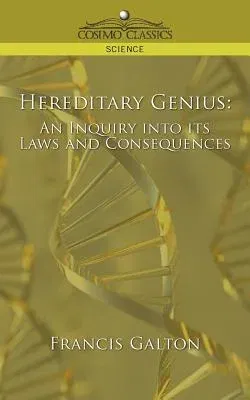I have no patience with the hypothesis occasionally expressed, and often
implied, especially in tales written to teach children to be good, that
babies are born pretty much alike, and that the sole agencies in
creating differences between boy and boy, and man and man, are steady
application and moral effort. It is in the most unqualified manner that
I object to pretensions of natural equality. The experiences of the
nursery, the school, the University, and of professional careers, are a
chain of proofs to the contrary. -from "Classification of Men According
to Their Natural Gifts" One of the greatest names in Victorian science,
Francis Galton has been all but forgotten in the popular culture, but
his work on philosophy of genetics and the inheritability of human
characteristics broke new ground in the late 19th century. With this
1869 book (along with his 1889 work Natural Inheritance), he founded an
entirely new scientific discipline, one that approached human biology
with a systematic rigor as he explored the degree of "eminence" among
British men and determined that intelligence and accomplishment were
inheritable. Though some of Galton's work has been dismissed because of
its causal connection to the deplorable applications of eugenics
programs in the 20th century, this remains an important work in the
history of biological science. "I do not think I ever in all my life
read anything more interesting and original" Charles Darwin said about
this extraordinary book. Among his many significant accomplishments,
British scientist SIR FRANCIS GALTON (1822-1911) was an explorer, a
geographer, a statistician, and inventor of fingerprint identification.
In addition to more than 300 scientific papers, he wrote the books
Narrative of an Explorer in Tropical South Africa (1853), Finger Prints
(1893), Memories of My Life (1908), and others.


